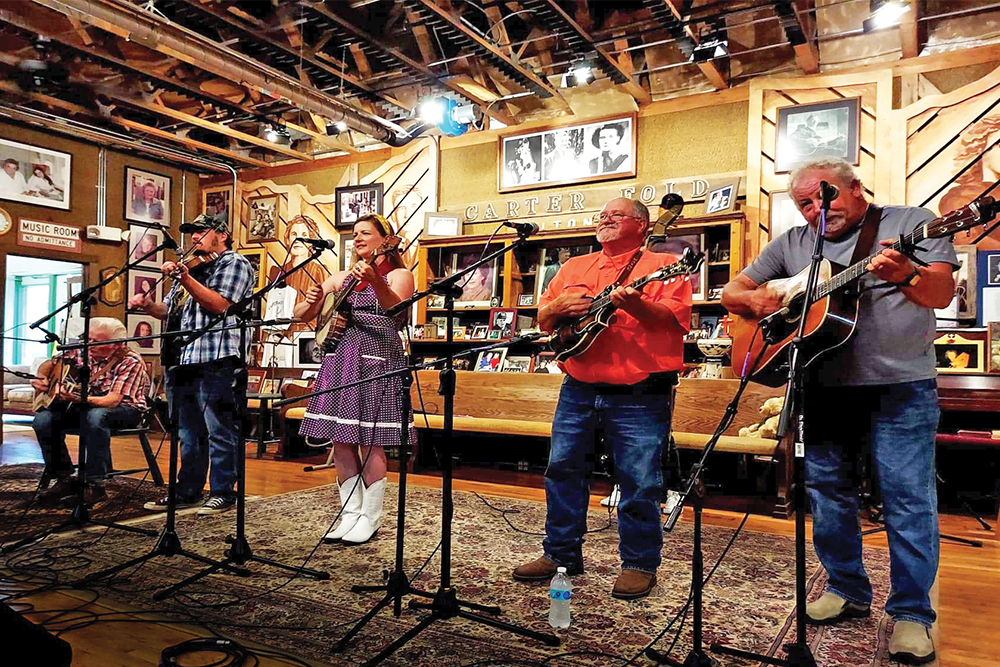Heritage Music Shapes the Future of Southwest Virginia on The Crooked Road
As U.S. Route 58 winds west along the southern border of Virginia into the Blue Ridge Mountains, the road takes on another name — drawing on the distinctive music for which southwestern Virginia is known.
Country music can trace its roots to the 1927 Bristol Sessions recordings by legends like the Carter Family and Jimmie Rodgers, now known as the “Big Bang of Country Music.” Yet the old-time string bands and a cappella gospel, blues, ballad, bluegrass, and other performers playing here today have a broader listening audience than ever.
The Crooked Road: Virginia’s Heritage Music Trail is a 330-mile driving route through Southwest Virginia, governed by a nonprofit organization that helps drive tourism to the region. In 2004, the Virginia General Assembly approved the economic designation that officially united a region linked by nine major venues for traditional music. Since that time, The Crooked Road branding has expanded to cover 19 counties, four independent cities, more than 50 towns, and 60-plus affiliated venues and festivals.
According to data gathered from the nonprofit's 2019 economic impact survey, in combination with reporting from partner organization Friends of Southwest Virginia and the Virginia Tourism Corporation, the draw of traditional music contributes to $6.4 million in annual spending in southwest Virginia. Add to this the impact of related business and employee spending, and The Crooked Road generates an annual impact of closer to $9.2 million in a largely rural region.
Major venues on the trail include the Floyd Country Store and its Friday Night Jamboree concerts and County Sales, a record store known for its large selection of bluegrass and old-time titles. The Galax Old Fiddlers’ Convention has drawn 30,000 attendees a year to the city since 1935, and the Rex Theatre hosts heritage music as part of its Blue Ridge Backroads radio show. Just outside Bristol is the Carter Family Fold, owned by descendants of the legendary Carter Family, one of the first groups to record commercially produced country music.
The Country Cabin II in the city of Norton is the longest continuously running venue along The Crooked Road, having operated since 1938. Half an hour up U.S. Route 23 in Clintwood is the Ralph Stanley Museum, which showcases memorabilia from the legendary singer and banjo player’s 60-year career.
The affinity for traditional Virginia music defies state borders. The nonprofit has traced approximately 42% of Crooked Road venue attendees to outside the region. Visitors hail from nearby North Carolina and Tennessee, but also as far away as the United Kingdom, Brazil, Australia, and Japan.
The traditional “high lonesome sound” may be what attracts listeners, but The Crooked Road organization keeps looking forward. The nonprofit is taking steps to create a strong future for musicians interested in carrying on these traditions.
“We’re trying to make sure that the musicians are supported and know that they can be paid for their craft,” said Carrie Beck, executive director of The Crooked Road.
This includes helping musicians book concerts and supporting performance series at local venues. The Crooked Road has established a heritage music fund that offers grants to musicians of up to $500 for use toward professional projects such as recording work, website development, and headshots. The organization also launched an Artist-in-Residence program in 2021, which provides a stipend and support to a local musician.
North Carolina transplant Andrew Small is the first to take advantage of that program. A versatile musician, Small is accomplished as a singer and performer on the fiddle, mandolin, banjo, guitar, and double bass.
It was with outreach in mind that The Crooked Road invited Small to serve as a consultant for events such as the Southwest Virginia Music and Culture Institute, hosted by the Virginia Department of Education, which provided an opportunity for music teachers to explore traditional music, folk instruments, and improvisation. According to Small, “That includes things like learning music by ear and playing together without sheet music in small ensembles and learning things on the fly. It’s a different way of learning, by sharing music in a communal way.”
That’s just one way traditional music is shaping the region’s future. But for the artists jamming on any given weekend along The Crooked Road, this blending of yesterday and tomorrow is part of the beauty of the music they play.
“There’s this amazing culture of dance music in Virginia, and locals come out and dance to this old-time music. It’s a beautiful thing to see how it brings the generations together,” Small said. “The Crooked Road keeps these music traditions alive.”



